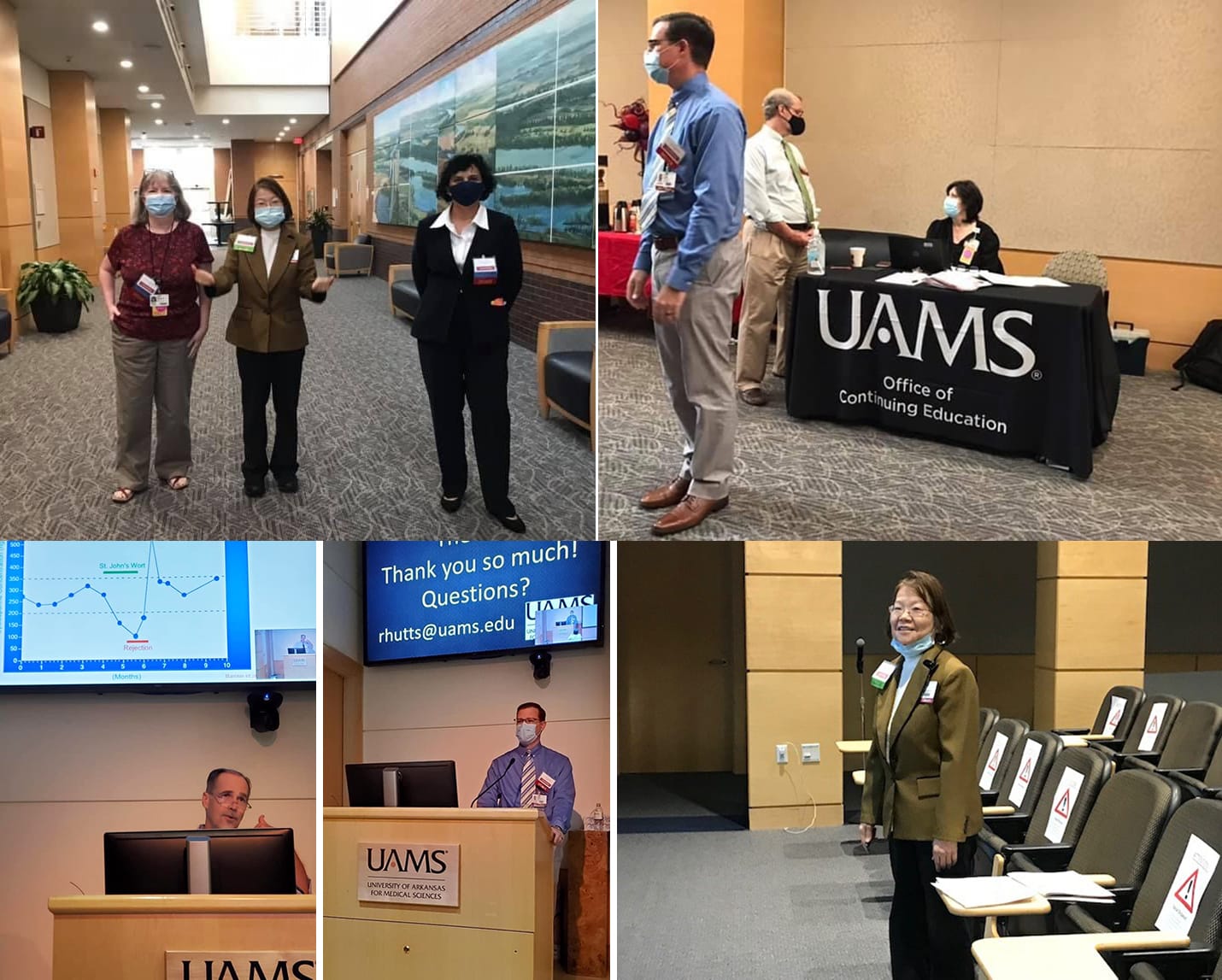22nd Annual Geriatrics Update Examines Key Topics: Herbal Supplements, CBD, COPD, COVID
| When a patient is asked what prescription or over-the-counter drugs they are taking, they seldom include plant-based dietary supplements, even though these supplements can interact and even counteract other medications.
“When in doubt, avoid taking botanical dietary supplements with conventional medications,” said Bill Gurley, Ph.D. “If you must, then separate them by at least four hours. There are some that will still have interactions even after that. Call your pharmacist if you have any questions.”
Gurley is the principal scientist and director of the Clinical Research Facility within the National Center for Natural Products at the University of Mississippi. He also is the former vice chair of the UAMS College of Pharmacy Department of Pharmaceutical Sciences.
He was one of dozens of speakers at the 22nd annual Geriatrics Update and Long-term Care Conference held Sept. 16-18 at the UAMS Donald W. Reynolds Institute on Aging. The conference is also supported annually by Jeanne Wei, M.D., Ph.D., executive director of the Institute on Aging.
More than 160 people attended the conference, which provides the most current information on the aging population to physicians and other health professionals, as well as caregivers. It seeks to educate the audience on the latest evidence-based standards and outcomes in geriatric medicine and long-term care management. Most of the audience listened via a live video stream, due to the ongoing COVID-19 pandemic.
“It still amazes me how few health care professionals have an appreciation of the large number of people who are actually taking botanical dietary supplements and can even interact,” Gurley said. By one estimate, 50% of all hospitalized patients are taking some sort of herbal supplement, but patients are seldom asked about them.
Some supplements, especially those for weight loss, contain the equivalent of three to six cups of coffee. That doesn’t sound like too much because many people drink that much coffee daily, but when taking a botanical supplement, it’s equivalent to drinking all those cups at once, not over the course of several hours, Gurley said.
St. John’s Wort is a “pretty decent” antidepressant, but it’s “probably the most problematic botanical out there,” Gurley said. He cited the case of a transplant patient who experienced organ rejection because of the way one of her anti-rejection medications interacted with the St. John’s Wort that she was taking.
Gurley delivered two back-to-back presentations. His second one focused on another herbal supplement, cannabidiol (CBD).
“We are living in a world of CBD,” he said. “It is the top-selling herbal in the United States. It comes in a myriad of forms. Nevertheless, the FDA does not recognize them in any regulatory capacity.”
CBD isn’t intoxicating or hallucinogenic, and it can be an effective drug against nausea and may help to reduce inflammation and pain. Although many proponents and promoters of CBD claim it can cure almost anything, the clinical and scientific data only support its use in treatment for opioid addiction, mild anxiety and in some cases, epilepsy.
Even in those cases, there aren’t good guidelines as to proper dosages, duration of use or how it can be used with other medications, Gurley said.
COPD
Chronic obstructive pulmonary disease (COPD) in older Americans was addressed by Manish Joshi, M.D., professor of medicine in the UAMS Division of Pulmonary and Critical Care Medicine in the Department of Internal Medicine. COPD is a leading cause of mortality in the United States and is projected to markedly increase in prevalence by 2030.
Each drug treatment for COPD should be individualized and guided by the severity of symptoms, risk of exacerbations, side effects, the patient’s other medical conditions besides COPD, drug availability and cost, Joshi said.
Rehabilitation should improve symptoms, quality of life and participation in everyday activities. Too often, pulmonary rehabilitation for COPD is dismissed because of the frailty of the patient, he said.
The symptom burden in patients with severe COPD is high and is comparable to that of patients with cancer in function and quality of life, Joshi said. A palliative care approach to a patient with COPD increases the quality of life and perhaps even the quality of death.
They carry the burden longer than cancer patients do. That’s why if rehabilitation and drug treatment can’t alter a patients outcome and quality of life, then end-of-life discussions between the physician, patient and the patient’s family may need to happen, Joshi said.
COVID-19
Earlier in the conference, Atul Kothari, M.D., presented the latest information about COVID-19 and treatment for it.
Kothari is the senior physician specialist for the Outbreak Response and Hospital Acquired Infections Branch of the Arkansas Department of Health.
“Although we’re still feeling overwhelmed by COVID-19, we’ve come a long way in a year and a half,” Kothari said.
In 18 months, public health authorities and health care professionals have acquired effective vaccines, ramped up genetic sequencing and developed new therapeutics, he said.
“Use the infodemic to your advantage. There is a lot of literature out there,” Kothari said. “Continue having conversations with your patients and families, they will tell you about their hesitancies and fears. Do not impose on them. This is a pandemic, not a sprint. It’s a medical disease. Treat it like a medical disease. We have the tools.”
